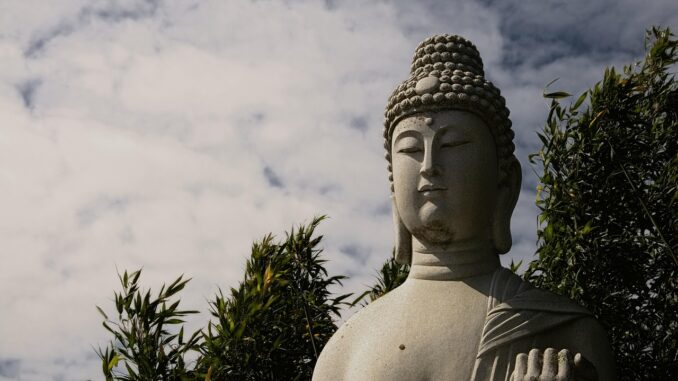
Dhamma means the teachings of the Buddha. It also has other. meanings such as object of mind, a state, a phenomenon, etc. The Dhamma protects those who practise the Dhamma from dangers and falling into the four woeful states (apaya): hell (niraya), animal kingdom (tiracchana), hungry ghosts (peta) and demons (asura)
The Chamna dea’s with truth and facts that can be resaled and venlled by personal experience and is not concemed with theones and speculations
The Buddha said,
The person who sees the Chamna de realises the Dhammal sees the Buddha
It is very important for everyone to learn the Truth through their own experience. Otherwise he or she might be confused by the many different doctrines. In one sutta, the Buddha asked us to learn something before we accept it
Practise Me Dhamma in a proper way and avoid improper practice The one who foilows the right path lives happily in the world and the next
Kalama Sutta
Once the Lord Buddha and many bhikkhus went to Kesamutti town. The Kalamas dwelling there went to see the Buddha. Their town was located at the entrance of a thick forest. Whoever wanted to go through the forest had to stop at the town for a night or so. Of those, some were brahmins and some were ascetics. They tried to persuade the people there, saying their doctrine was right and noble, and the doctrines of others were wrong and shallow. Some condemned others’ views or teachings. Because of that, the Kalamas had doubts. They were unable to judge as to which teaching was right and which was wrong. That was why they approached and consulted the Buddha.
The Buddha said:
Kms, do not accept anything on mere hearsay. Do not accept anything by mere tradition Do not accept anything on account of rumours. Do not accept anything xat because & accords with your serpeunes Do not accept anything by mere supposition. Do not accept anything by mere inference. Do not accept anything merely because it agrees with your preconceived notions Do not accept anything merely because it seems acceptable. Do not accept anything thinking that the ascetic is respected by us. But when you know for youratives These things are immoral, these things are blameworthy, these things are censured by me wise, these things, when performed and undertaken, conduce to ruin and sorrow then indeed do you reject them. When you know for yourselves these things aw mural these things are meinas, these ings are praised by the wise these things when performed and undertaker, conduce to well-being and happiness-then do you live and act accordingly
So it is good for everyone to learn, practise and verify for themselves. before accepting anything. In the present age, the existence of the Buddhusdsana, (the Dispensation), is because of the venerable Sangha and supporters.
WHAT IS SANGHA?
The word Sangha in Pali means the Order or Community of Bhikkhus (monks) and Bhikkhunis (nuns). Though the Buddha did not leave any written teachings when he entered into Mahiparimbhünı, his disciples (the venerable Sangha) tried to memorise all the Buddha’s teachings by reciting them daily. They recited all the teachings of the Lord Buddha from. generation to generation until the Sangha committed all the teachings into writing. Had the venerable Sangha not taken care of the teachings, all the teachings would probably have disappeared by now.
So the venerable Sangha established by the Lord Buddha is indeed worthy of being paid homage to for their good deeds: learning the Doctrine (pariyatti), practising the Dhamma (patipatti), and realising its goal (pațivedha).
Who with strong mind, practising themselves thoroughly in the Dispensation of Buddha, they have attained the highest state, having encountered the immortality, they enjoy the perfect peace (Nibbana) in absolute freedom. In the Sangha is this precious jewel (holiness) found, so by this truth, May all beings be happy
-Ratana Sutta
Leave a Reply